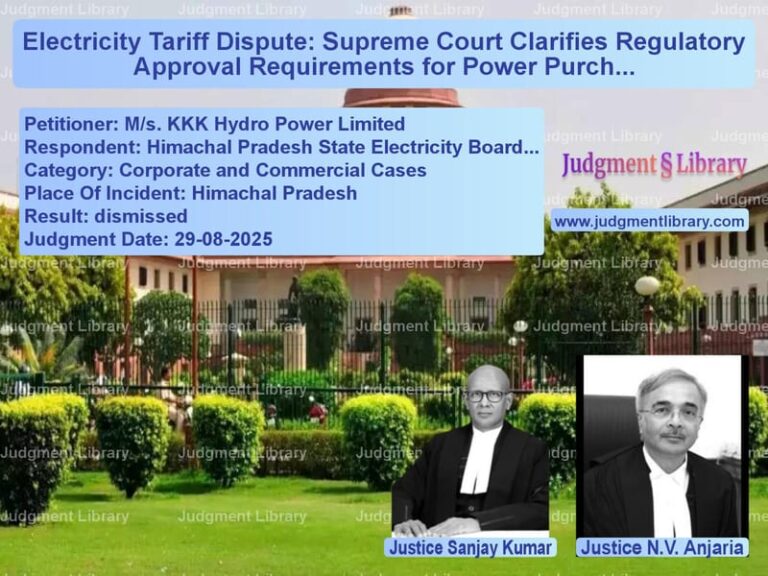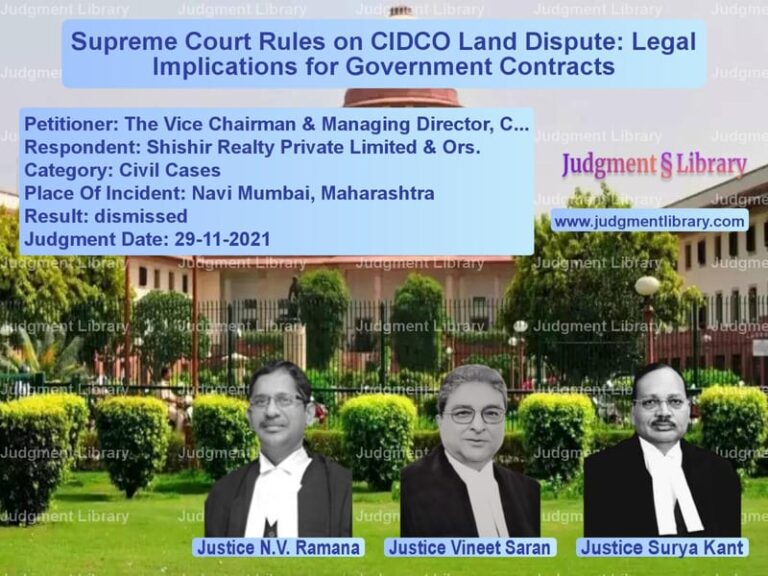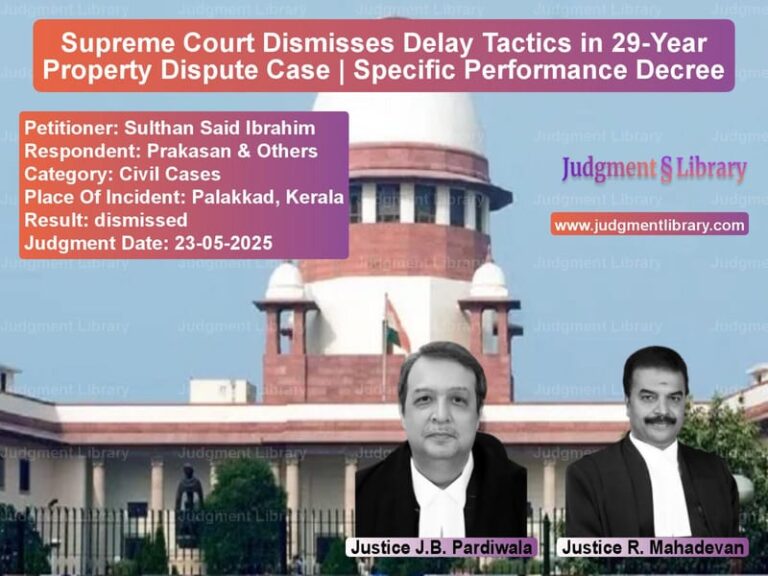Military Casualty and Family Benefits: Supreme Court’s Judgment on Liberalized Family Pension
The case of Union of India & Ors. vs. Saroj Devi deals with the eligibility for Liberalized Family Pension (LFP) under the military service rules. The dispute arose after the death of Naik Inderjeet Singh, who was serving in Jammu & Kashmir when he died due to cardiopulmonary arrest under extreme climatic conditions while on duty. The family sought the Liberalized Family Pension (LFP) which was initially denied. The Supreme Court, in its judgment dated December 3, 2024, examined the applicability of the LFP under the circumstances of the deceased’s death, considering the nature of his service and the conditions in which he died.
Background of the Case
The respondent, Saroj Devi, is the widow of Naik Inderjeet Singh, who was employed in the Indian Army and was part of an Area Domination Patrol. This patrol was launched from Manjit Main to Rangwar Post, located near the Line of Control (LC) for domination of the Rangwar gap. On 23rd January 2013, the deceased complained of breathlessness during his duty in extreme climatic conditions from 1:00 a.m. to 3:30 a.m. His condition worsened, and he was evacuated on foot to Chowkibal, where he was declared dead. Initially, his death was categorized as a ‘battle casualty,’ but it was later reclassified as a ‘physical casualty’ attributable to military service. The widow, Saroj Devi, was granted terminal benefits, including a special family pension, but was denied the Liberalized Family Pension (LFP), which she then challenged before the Armed Forces Tribunal.
The Tribunal ruled in favor of the respondent, directing that the LFP and an ex-gratia lumpsum amount payable in case of battle casualties be provided to her. The appellants, Union of India, disagreed with this decision and filed an appeal in the Supreme Court.
Arguments of the Petitioner
The petitioner, represented by the Union of India, argued that:
- Liberalized Family Pension (LFP) is applicable only in cases of death attributable to certain specified situations under the Ministry of Defence orders, including those outlined in categories D and E of paragraph 4.1 of the order dated 31st January 2001.
- The deceased’s death was classified as a ‘physical casualty’ attributable to military service, not a battle casualty. Therefore, the respondent was only entitled to a special family pension, not the Liberalized Family Pension.
- The respondent’s case did not fall under the provisions for LFP, particularly under the specified conditions of category E of the order.
Arguments of the Respondent
The respondent, Saroj Devi, countered the appellant’s arguments by highlighting the following points:
- The deceased was on active military duty in a high-risk zone near the Line of Control (LC), and his death occurred due to extreme climatic conditions while performing his duties as part of an Area Domination Patrol. This situation should qualify for LFP under category E of the Ministry of Defence order, especially considering the hazardous conditions.
- The death of the deceased should be classified as a ‘battle casualty’ as he was exposed to life-threatening conditions on the battlefield, despite not dying from direct enemy action. The circumstances surrounding his death, including the extreme weather and deployment on the frontlines, should meet the criteria for LFP.
- The Tribunal’s decision to award LFP was just, as the circumstances of the deceased’s death were akin to those listed under category E, particularly the clause concerning death due to conditions on or near the Line of Control.
Supreme Court’s Analysis
The Supreme Court carefully analyzed the case by considering the legal framework for awarding the Liberalized Family Pension and the circumstances under which it can be granted. The Court noted that:
- The Ministry of Defence’s order dated 31st January 2001 governs the eligibility for LFP and specifies that LFP is only granted in cases of death resulting from certain situations, including those covered under category E.
- The death of the deceased was not caused directly by enemy action or a battle situation as typically defined under the relevant categories. However, the Court took into account that the deceased was engaged in military operations in close proximity to the Line of Control (LC) and was exposed to extreme climatic conditions while on duty.
- The Court concluded that despite the reclassification of the death as a ‘physical casualty,’ the circumstances of the deceased’s death, including exposure to war-like conditions and extreme weather, qualified for LFP under clause 1(g) of the Army Order, which covers casualties caused by such conditions near the LC.
- The Court also noted the previous decisions in the cases of Kanchan Dua v. Union of India and Radhika Devi v. Union of India, which were distinguished based on the facts of those cases. The Court clarified that those rulings were not directly applicable to the present case due to the unique circumstances surrounding the deceased’s death.
Final Judgment
The Supreme Court ruled in favor of the respondent, Saroj Devi, stating:
- The deceased’s death, while attributed to a ‘physical casualty,’ occurred in war-like conditions and near the LC, and thus, the respondent was entitled to LFP as per the relevant provisions of the Ministry of Defence order.
- The Court emphasized the importance of acknowledging the sacrifices made by soldiers and their families, especially when those sacrifices occur under challenging and hazardous conditions.
- The appellant’s refusal to grant LFP was deemed unjust, and the Court ordered the respondent to be granted LFP along with an ex-gratia payment, as stipulated for battle casualties.
The judgment served as a reminder of the Court’s commitment to protecting the rights of the families of military personnel and ensuring that they are adequately compensated for the sacrifices made by their loved ones in service to the nation.
Petitioner Name: Union of India.Respondent Name: Saroj Devi.Judgment By: Justice Abhay S. Oka, Justice Augustine George Masih.Place Of Incident: Jammu and Kashmir.Judgment Date: 02-12-2024.
Don’t miss out on the full details! Download the complete judgment in PDF format below and gain valuable insights instantly!
Download Judgment: union-of-india-vs-saroj-devi-supreme-court-of-india-judgment-dated-02-12-2024.pdf
Directly Download Judgment: Directly download this Judgment
See all petitions in Workplace Harassment
See all petitions in Pension and Gratuity
See all petitions in Public Sector Employees
See all petitions in Judgment by Abhay S. Oka
See all petitions in Judgment by Augustine George Masih
See all petitions in dismissed
See all petitions in Modified
See all petitions in supreme court of India judgments December 2024
See all petitions in 2024 judgments
See all posts in Service Matters Category
See all allowed petitions in Service Matters Category
See all Dismissed petitions in Service Matters Category
See all partially allowed petitions in Service Matters Category







